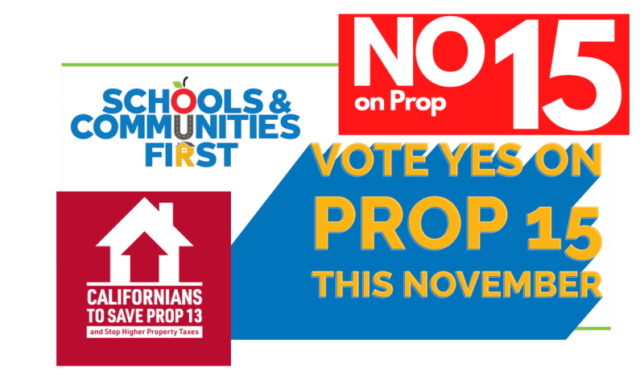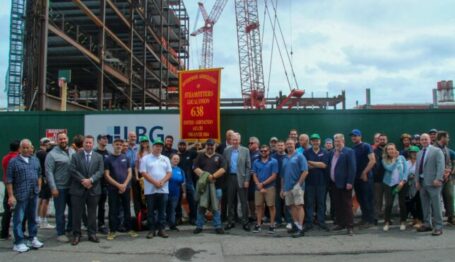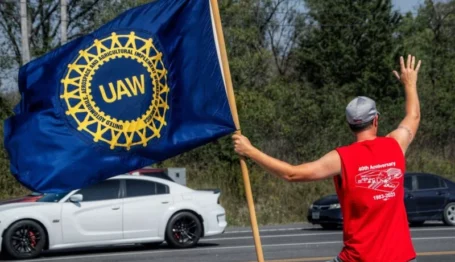Labor Watch
The Special Interests Behind California’s Proposition 15


This November, Californians will go to the polls to vote on Proposition 15, a new tax on commercial real estate that promises to further degrade the state’s already poor business environment. Opponents of the tax have banded together to sound the alarm over how it will harm the state’s economy. But they are struggling against a better-funded coalition of interest groups—led by labor unions and big philanthropy—who are trying to sway a simple majority of Californians to vote for the largest property tax hike in the state’s history.
Propositions and Property Taxes
Proposition 15’s roots date back to Proposition 13 in 1978, which limited real estate assessments for property tax purposes. Under Proposition 13, market value assessments are conducted only when a property changes ownership or undergoes new construction. Absent one of those two conditions, assessment increases are capped at 2 percent per year, which is often significantly below the rate of appreciation in the property’s actual market value.
For practical purposes, this means that two identical properties can have drastically different assessed values (and thus tax liabilities) based entirely on how long the current owners have owned them.
Proposition 15 would modify this framework to exclude many commercial and industrial properties, requiring them to be reassessed at fair market value at least every three years. Residential property, as well as owner-aggregated commercial holdings of $3 million or less, would continue to be covered by Proposition 13.
This is referred to as a “split-roll” system. Proposition 15 might generate anywhere from $7.5 to $12 billion in annual tax revenue if passed and fully implemented. Most of this money would be earmarked for schools and local government.
Opponents of Proposition 15 point out that these new taxes would simply be passed onto small businesses, many of which rent their spaces from larger commercial landlords, and ordinary Californians, who already endure one of the highest costs of living in the country. They also argue that it will accelerate the exodus of companies from California to more business-friendly states.
A wide variety of business and civic interest groups have coalesced into the “No on Prop 15” coalition to draw voter attention to these negative impacts. As of mid-September, No on Prop 15 accounted for roughly 80 percent of the $22 million in total contributions reported by official committees formed to oppose Proposition 15.
The “Yes on 15” Coalition
Those numbers are dwarfed by the over $36 million raised by supporters of Proposition 15’s new taxes. More than 76 percent of those contributions have gone to the “Yes on 15” coalition, also known as “Schools and Communities First.” Labor unions are the dominant interest group behind the Yes on 15 campaign, with sizable funding also coming from the philanthropic sector.
According to disclosures on the California secretary of state’s website, Yes on 15 reported over $14.8 million in total contributions (monetary and nonmonetary) in the 2019–2020 election cycle (covering April 2019 through July 2020). Roughly 74 percent came from labor unions and their PACs, with the California Teachers Association and SEIU California accounting for a combined $10 million.
Big money has also come from philanthropy, especially Facebook CEO Mark Zuckerberg’s Chan Zuckerberg Initiative. In late July, the Chan Zuckerberg Initiative announced $4.5 million in new support for Proposition 15, bringing its total to over $6.3 million. Other nonprofit contributors include the Liberty Hill Foundation, the San Francisco Foundation, and the California Community Foundation.
Other organizations that have officially endorsed Proposition 15 include the California Democratic Party, several local chapters of the Democratic Socialists of America, and activist groups as diverse as Sierra Club California, the League of Women Voters of California, the Mexican American Legal Defense and Education Fund, and the ACLUs of both Northern and Southern California. Naturally, a slew of national, state, and local labor unions—particularly teachers unions—also back the split-roll framework.
A long list of elected officials have also thrown their support behind Proposition 15, including some of the Democratic Party’s most well-known national figures. These include Joe Biden, Sen. Kamala Harris, Sen. Bernie Sanders, Sen. Elizabeth Warren, Sen. Cory Booker, Beto O’Rourke, and U.S. Reps. Barbara Lee, Karen Bass, and Ro Khanna. San Francisco Mayor London Breed and Los Angeles Mayor Eric Garcetti also count themselves among the supporters, as does Gov. Gavin Newsom.
A “Nail in the Coffin”
California’s economy is, by a significant margin, the largest in the United States. If it were its own country it would be the fifth largest in the world, roughly on par with India. Yet its business environment is generally considered poor when contrasted with other U.S. states. This is especially true with respect to the cost of doing business, where it has recently been ranked at or near the very bottom.
Taxation is among the archetypical costs of doing business. By threatening large commercial operations with tax hikes, Proposition 15 strikes at the very heart of the state’s economy. If those companies are forced to charge more for their goods or services due to higher property taxes, the trickle-down effects will impact all Californians, likely hitting small businesses and renters the hardest. That’s if the companies don’t pack up and leave altogether.
This says nothing of the administrative burden that reassessment would likely place on local government, a burden that one official described as “impossible—not difficult, but impossible” to meet.
Proposition 15 would be a deeply flawed idea in the best of times, but in the wake of COVID-19 it would be a “nail in the coffin” of the state’s economy. In light of the preferred destination for companies abandoning the Golden State, Proposition 15 might be more accurately named the “Texas Economic Stimulus Amendment of 2020.” That’d certainly give voters a sense of its ultimate impact.
None of this matters, of course, to the special interests pushing Proposition 15—especially labor unions and their nonprofit and political allies—who see the private sector mainly as a font from which to extract wealth for their own purposes.



